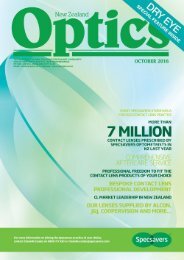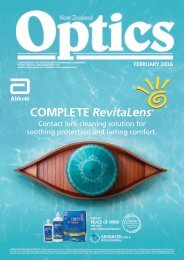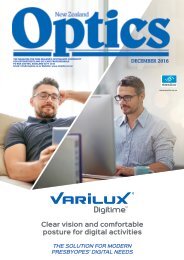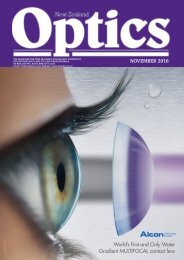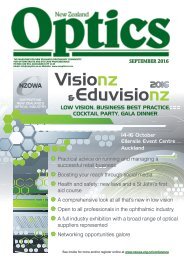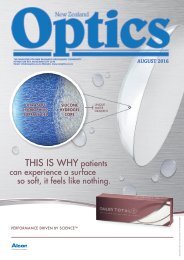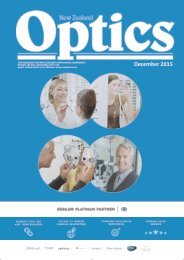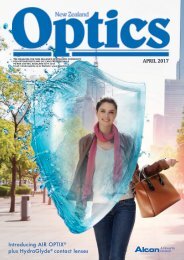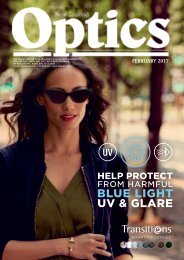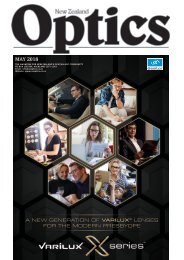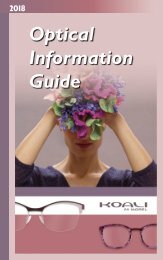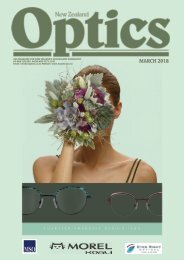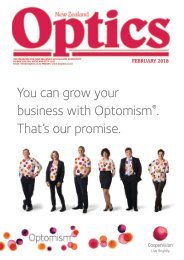Apr 2016
Create successful ePaper yourself
Turn your PDF publications into a flip-book with our unique Google optimized e-Paper software.
OTs tackle low vision<br />
Collaboration<br />
between the<br />
occupational<br />
therapy (OT) community<br />
and an advocacy group<br />
has resulted in several<br />
public awareness<br />
projects and a developing<br />
curriculum for OT<br />
students to specialise in<br />
low vision care.<br />
The development began<br />
a few years ago when<br />
Dr Mary Butler, Otago<br />
Polytechnic principal<br />
lecturer, put some<br />
third-year students<br />
in-touch with the Visual<br />
Impairment Charitable<br />
Trust Aotearoa (VICTA) to develop ideas for projects<br />
to help that community. Around the same time<br />
Associate Professor Gordon Sanderson from<br />
Otago University encouraged Dr Butler to develop<br />
a curriculum for postgraduate OT students to<br />
concentrate on that area.<br />
Occupational therapists are interested in<br />
function and practical ways to improve lives,<br />
says Dr Butler. Low vision is a central field in OT<br />
practice overseas, but in New Zealand, there are<br />
opportunities for OTs to become more involved in<br />
helping low vision patients to navigate life in spite<br />
of their visual problems and to work far more<br />
closely with optometrists.<br />
“I’m very much trying to create a space where<br />
the profession will say, ‘we can do this’, and to<br />
encourage OTs to work closely with optometrists.<br />
I’m encountering too many old neighbours and<br />
clients who are unnecessarily disabled by visual<br />
impairment,” says Dr Butler.<br />
“Too often they are told by their ophthalmologist<br />
that there is nothing that can be done. This is<br />
not true. There are many things that OTs can do<br />
by problem solving everyday functions such as<br />
cooking, community mobility and remaining active.<br />
We tend to use the simplest equipment or none at<br />
all to bring about these outcomes.”<br />
Projects arising from student collaboration with<br />
VICTA include the development of high visibility<br />
canes and wristbands for low vision pedestrians to<br />
make drivers aware of their presence on the street.<br />
“The whole question of road safety was a big<br />
issue from the time we started the group,” says Dr<br />
Lynley Hood, founding trustee of VICTA.<br />
The Trust actually began as the Dunedin Visually<br />
Impairment group, a lively cadre of elderly people<br />
diagnosed with various problems that will lead to<br />
permanent sight loss. When it became clear their<br />
issues were of national significance, particularly in<br />
regard to the ageing population, Dr Hood and her<br />
cohort established the Trust.<br />
“If you’re no longer allowed to drive, even if<br />
you get half-priced taxi fares with a disability<br />
allowance, getting around becomes very<br />
expensive. Buses are the better option,” says Dr<br />
Hood. “But if you catch the bus, you still have to<br />
cross the road. (Low vision people) don’t have<br />
white canes or guide dogs, so motorists don’t<br />
know that they can’t see them properly. So, one<br />
of the first suggestions was high visibility walking<br />
sticks. They are a hit with bus drivers.”<br />
Still from video promoting the use of high visibility sticks and wristbands from OTs<br />
collaboration with VICTA<br />
VICTA worked with a local fabricator to develop<br />
four high visibility walking sticks, made from<br />
carbon fibre with high contrast colours sure to be<br />
visible from blocks away. Go Bus and Richies now<br />
train drivers to recognise high visibility canes and<br />
wrist bands thanks to VICTA’s efforts. While one of<br />
Dr Butler’s third year OT students, Keri McMullan,<br />
helped produce a video promoting the service,<br />
which VICTA intends to use to promote visibility<br />
canes around the country for World Sight Day in<br />
October.<br />
McMullan was also responsible for a video<br />
promoting the use of iPads among low vision<br />
recipients and, according to Dr Butler, a third<br />
video promoting safe use of mobility scooters is in<br />
the works.<br />
“I applied for a small amount of funding to help<br />
promote what occupational therapy can do for<br />
people with low vision,” says Dr Butler. “We have<br />
been running student placements, making videos,<br />
creating Facebook pages, setting up an equipment<br />
library, running iPad classes for people with low<br />
vision and workshops for OTs. Lynley and VICTA have<br />
been very important in helping us to get traction<br />
and the profession is now coming on board.”<br />
A postgraduate paper in vision rehabilitation will<br />
be rolled out at Otago Polytechnic in the second<br />
semester of the <strong>2016</strong> academic year. Dr Butler says<br />
this has been brewing for some time.<br />
“It came about in a number different ways. My<br />
main area is brain injury and a few years ago I had<br />
a master’s student doing work on neurological<br />
vision impairment. She was working for the Blind<br />
Foundation, but she pointed out that people with<br />
neurological vision impairment and other kinds of<br />
low vision did not qualify for help from this service.<br />
At about the same time, Lynley and Gordon were<br />
setting up VICTA, which draws together 20-30 with<br />
low vision every month who are passionate and<br />
increasingly articulate about what they need. Put<br />
that together with the figures from the Disability<br />
Survey (2014), which found that that self-reported<br />
visual impairment among adults increased an<br />
astonishing 100% between 2001 and 2013 (from<br />
81,500 to 163,000) and it all clearly points to an<br />
area where we all have to do our bit; and we are<br />
particularly keen to work closely with optometrists<br />
both in practice and research about low vision”<br />
To see more on of what Kiwi OTs are doing for low<br />
vision patients check out: https://www.facebook.<br />
com/Vision-Matters-OT-866464940127100. ▀<br />
Celebration and a question of style<br />
Our last month before going to press has been a<br />
whirlwind of functions. The wonderful Macular<br />
Degeneration Race Day was a chance to enjoy a<br />
stunning day for a fabulous cause. Though my hat<br />
played havoc from a picture-taking point of view,<br />
it was a pure pleasure to be involved and Jai, our<br />
new editor, got her first taste of what a wonderful<br />
industry this is.<br />
There were more celebrations at the upbeat<br />
Excellence in Ophthalmology and Vision<br />
Research Prize Evening, where some of our most<br />
experienced professionals stepped up to support<br />
and celebrate some of our budding newcomers;<br />
at Auckland Eye, which was celebrating the<br />
end of its refurbishment; and at the Summer<br />
Students Research Symposium, covered by our<br />
well-known editor-at-large, Maryanne—all<br />
included in this month’s issue.<br />
A question of style<br />
We’ve tweaked a few things this month after<br />
some of you were kind enough to provide<br />
feedback on the magazine.<br />
Thanks to all those who say you’re loving<br />
the slightly fresher, more modern look of the<br />
magazine; the content mix of news, views, and<br />
celebrations; and the more national focus—<br />
though we can always do with more stories from<br />
around the country, so keep them coming.<br />
We’ve also listened to those who weren’t quite<br />
ready for the evolution (perhaps revolution) to<br />
that doyen of journalism styles, the Associated<br />
Press (AP), followed by most western publications.<br />
The AP only use full titles on first mention and<br />
thereafter simply refer to the person by their<br />
surname. (Even President Barack Obama becomes<br />
simply Obama). This ensures consistency, clarity,<br />
accuracy and brevity—a constant challenge in<br />
publishing as there are always more stories than<br />
ads to support the publication of those stories.<br />
AP’s style was also developed to avoid<br />
stereotypes and upsetting anyone as it treats<br />
everybody the same. Many women have a<br />
problem with the “Ms”, “Mrs” or “Miss” honorifics,<br />
which force them to reveal their married status,<br />
compared with men’s simple “Mr”. Sweden even<br />
EDITORIAL C ▀<br />
introduced a gender neutral title “hen” to avoid<br />
the problem. Some publications use first names<br />
for students instead of surnames, but just how<br />
much study, experience or age should a person<br />
have before they can be referred to in the same<br />
manner as their peers? Then there’s the question<br />
of medical doctors versus PhDs—the latter given a<br />
particularly bad rap by some honorary PhDs using<br />
the title—with many publications deciding to<br />
now only acknowledge someone’s PhD when it’s<br />
relevant to the story and only use the title “Dr” for<br />
medical practitioners.<br />
Here at NZ Optics we are your industry<br />
publication and though we can’t promise to do<br />
everything you ask (as that could diminish the<br />
editorial integrity of the publication, which is<br />
something we hold in very high regard to ensure<br />
all are treated fairly) we do care what you think<br />
and so have reinstated professional honorifics—so<br />
no Mr’s but lots of Dr’s.<br />
We love your feedback, especially your praise,<br />
and we do listen. This is your publication and the<br />
next generation’s too and everyone should have<br />
a voice, which is why we’re delighted to have an<br />
article this month from Nikku Singh (no title yet),<br />
the new president of the NZ Optometry Student<br />
Society (NZOSS).<br />
So enjoy this month’s issue, celebrating so many<br />
wonderful things people in this industry have<br />
achieved, and don’t be afraid to let us know what<br />
you think—we can take it!<br />
Lesley Springall, publisher, and Jai Breitnauer at the<br />
MDNZ Race Day<br />
NEW ZEALAND<br />
University’s generous gift<br />
Joan Ready, former Faculty of Medicine<br />
and Health Sciences administrator with<br />
the Department of Ophthalmology, has<br />
donated $250,000 to her former department for<br />
department head Professor Charles McGhee to<br />
spend at his discretion.<br />
Talking at the <strong>2016</strong> Excellence in Ophthalmology<br />
and Vision Research Awards (see story p4), Professor<br />
McGhee said he was both surprised and delighted at<br />
Ready’s generous gift, which would be used to help a<br />
number of young people reach their goals.<br />
Ready worked at the Faculty for more than 35<br />
years in various research and management roles,<br />
including research technician and manager for<br />
Physiology, Pathology, Clinical Sciences, School of<br />
Nursing and the Rural Health Inter-professional<br />
Immersion Programme. She joined Professor<br />
McGhee when the Department of Ophthalmology<br />
was in its infancy and stayed there for the last 17<br />
years.<br />
In the Faculty newsletter, Professor McGhee<br />
said he was extremely grateful to have had “Joan<br />
University vice-chancellor Professor Stuart McCutcheon and<br />
Joan Ready (front) with Professor John Fraser, dean of Faculty of<br />
Medical and Health Sciences, and Professor Charles McGhee (back)<br />
as a great friend and colleague over the last 17<br />
years” and that she played an integral part in<br />
many of the department’s major developments in<br />
ophthalmology.<br />
He anticipates the Joan Ready Fund will help start<br />
the careers of several future ophthalmologists and<br />
clinician scientists in New Zealand, he said. ▀<br />
Supplying Kiwi Optometrists<br />
with exclusive digital lens<br />
designs, quality and service<br />
Visit us at<br />
shamir.co.nz<br />
For more information contact<br />
DONALD CRICHTON<br />
New Zealand Sales Rep<br />
021 449 819<br />
Shamir quarter page ad NZ OPTICS APRIL <strong>2016</strong>.indd 1<br />
<strong>Apr</strong>il <strong>2016</strong><br />
11/03/<strong>2016</strong> 3:55:24 PM<br />
NEW ZEALAND OPTICS<br />
3



